Serving 758 students in grades Prekindergarten-5, Fine Mark L Elementary School ranks in the top 30% of all schools in Nevada for overall test scores (math proficiency is top 30%, and reading proficiency is top 30%).
The percentage of students achieving proficiency in math is 40% (which is higher than the Nevada state average of 28%). The percentage of students achieving proficiency in reading/language arts is 53% (which is higher than the Nevada state average of 44%).
The student:teacher ratio of 19:1 is equal to the Nevada state level of 19:1.
Minority enrollment is 85% of the student body (majority Hispanic and Asian), which is higher than the Nevada state average of 73% (majority Hispanic).
Quick Stats (2025)
- Grades: Prekindergarten-5
- Enrollment: 758 students
- Student:Teacher Ratio: 19:1
- Minority Enrollment: 85%
- Overall Testing Rank: Top 30% in NV
- Math Proficiency: 40% (Top 30%)
- Reading Proficiency: 53% (Top 30%)
- Science Proficiency: 15-19% (Btm 50%)
- Source: National Center for Education Statistics (NCES), NV Dept. of Education
Top Rankings
Fine Mark L Elementary School ranks among the top 20% of public schools in Nevada for:
Category
Attribute
Diversity
School Overview
Fine Mark L Elementary School's student population of 758 students has declined by 11% over five school years.
The teacher population of 39 teachers has stayed relatively flat over five school years.
Grades Offered
Grades Prekindergarten-5
Total Students
758 students
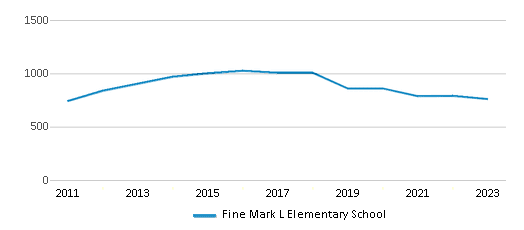
Gender %
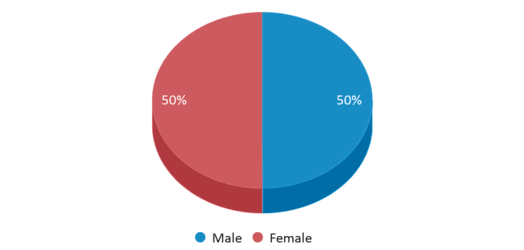
Total Classroom Teachers
39 teachers
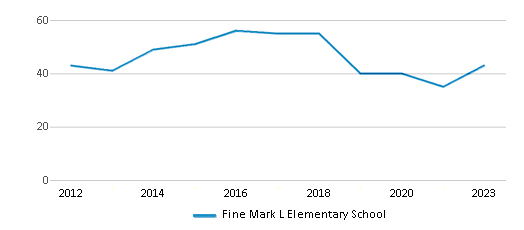
Students by Grade
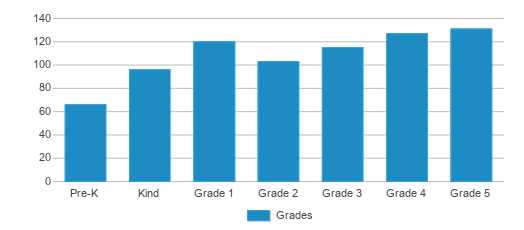
School Rankings
Fine Mark L Elementary School ranks within the top 30% of all 692 schools in Nevada (based off of combined math and reading proficiency testing data).
The diversity score of Fine Mark L Elementary School is 0.80, which is more than the diversity score at state average of 0.71. The school's diversity has stayed relatively flat over five school years.
Overall Testing Rank
#177 out of 692 schools
(Top 30%)
(Top 30%)
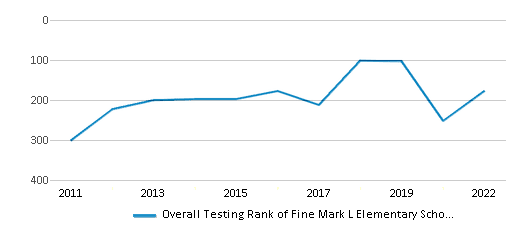
Math Test Scores (% Proficient)
40%
28%
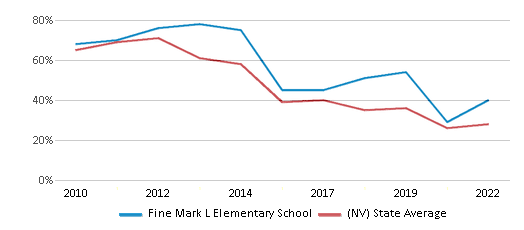
Reading/Language Arts Test Scores (% Proficient)
53%
44%
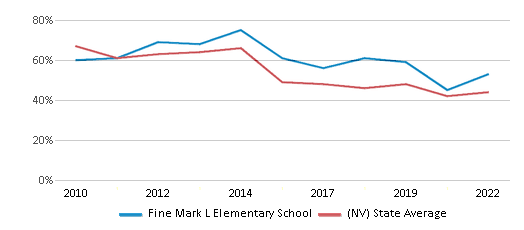
Science Test Scores (% Proficient)
15-19%
26%
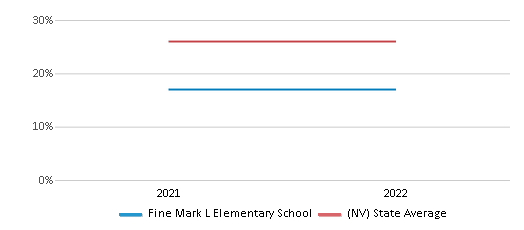
Student : Teacher Ratio
19:1
19:1
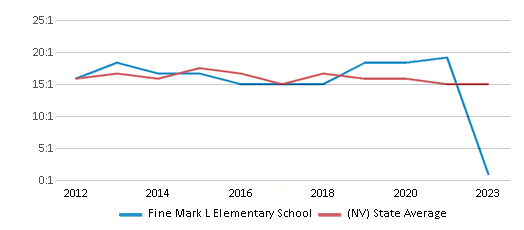
American Indian
n/a
1%
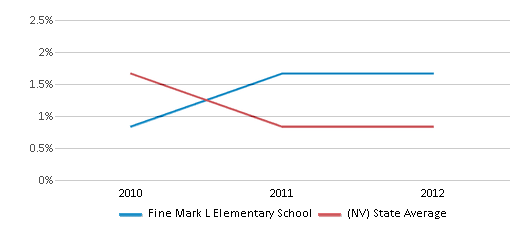
Asian
24%
6%
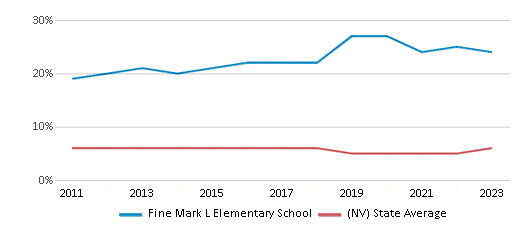
Hispanic
28%
45%
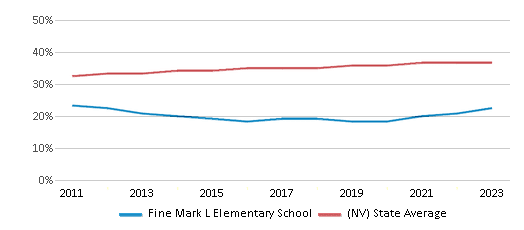
Black
16%
12%
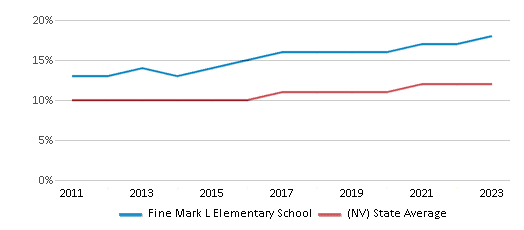
White
15%
27%
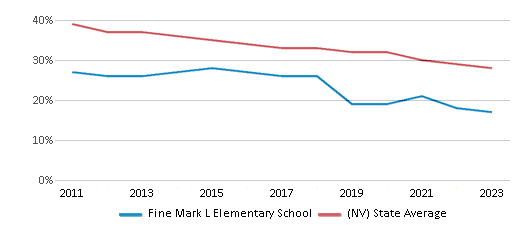
Hawaiian
3%
1%
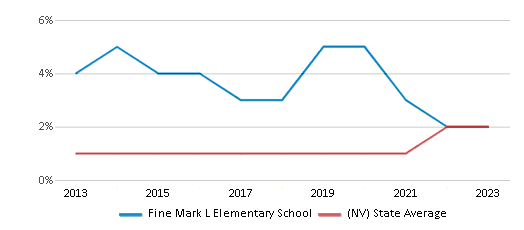
Two or more races
14%
8%
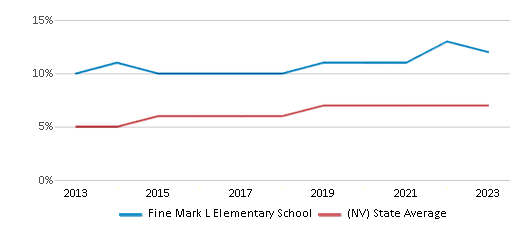
All Ethnic Groups
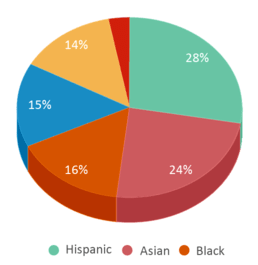
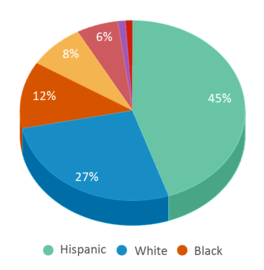
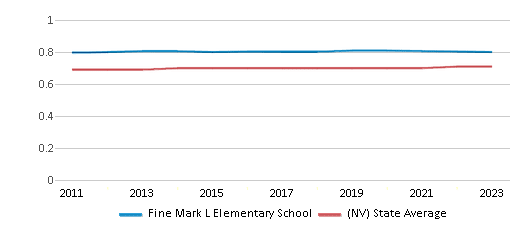
Participates in the National School Lunch Program (NSLP)
Yes
Eligible for Free Lunch
98%
80%
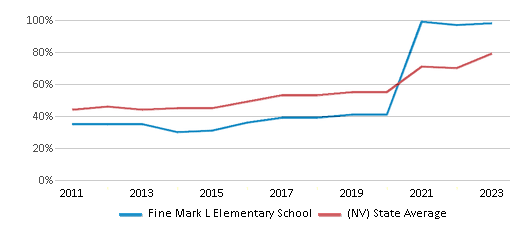
Eligible for Reduced Lunch
2%
2%
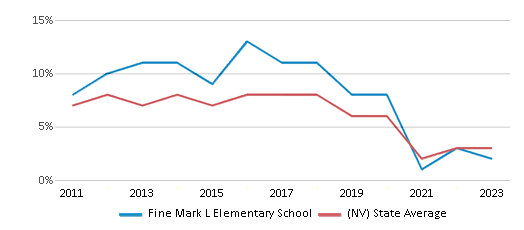
School Statewide Testing
School District Name
Source: National Center for Education Statistics (NCES), NV Dept. of Education
Frequently Asked Questions
What is Fine Mark L Elementary School's ranking?
Fine Mark L Elementary School is ranked #177 out of 692 schools, which ranks it among the top 30% of public schools in Nevada.
What schools are Fine Mark L Elementary School often compared to?
Fine Mark L Elementary Schoolis often viewed alongside schools like Alamo Tony Elementary School by visitors of our site.
What percent of students have achieved state testing proficiency in math and reading?
40% of students have achieved math proficiency (compared to the 28% NV state average), while 53% of students have achieved reading proficiency (compared to the 44% NV state average).
How many students attend Fine Mark L Elementary School?
758 students attend Fine Mark L Elementary School.
What is the racial composition of the student body?
28% of Fine Mark L Elementary School students are Hispanic, 24% of students are Asian, 16% of students are Black, 15% of students are White, 14% of students are Two or more races, and 3% of students are Hawaiian.
What is the student:teacher ratio of Fine Mark L Elementary School?
Fine Mark L Elementary School has a student ration of 19:1, which is equal to the Nevada state average of 19:1.
What grades does Fine Mark L Elementary School offer ?
Fine Mark L Elementary School offers enrollment in grades Prekindergarten-5
What school district is Fine Mark L Elementary School part of?
Fine Mark L Elementary School is part of Clark County School District.
School Reviews
Review Fine Mark L Elementary School. Reviews should be a few sentences in length. Please include any comments on:
- Quality of academic programs, teachers, and facilities
- Availability of music, art, sports and other extracurricular activities
Recent Articles

What Is A Charter School?
Explore the world of charter schools in this comprehensive guide. Learn about their history, how they operate, and the pros and cons of this educational innovation. Discover key facts about charter schools, including admission policies, demographics, and funding, as well as what to look for when considering a charter school for your child.

10 Reasons Why High School Sports Benefit Students
Discover the 10 compelling reasons why high school sports are beneficial for students. This comprehensive article explores how athletics enhance academic performance, foster personal growth, and develop crucial life skills. From improved fitness and time management to leadership development and community representation, learn why participating in high school sports can be a game-changer for students' overall success and well-being.

February 05, 2025
Understanding the U.S. Department of Education: Structure, Impact, and EvolutionWe explore how the Department of Education shapes American education, from its cabinet-level leadership to its impact on millions of students, written for general audiences seeking clarity on this vital institution.





